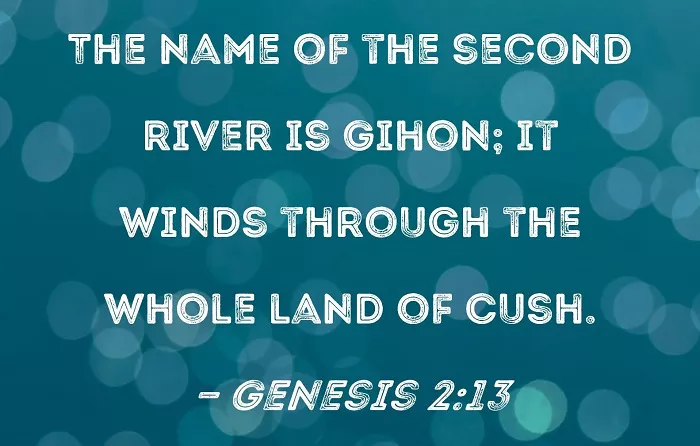Read the Daily Bible Verse Genesis 2:13 To Strengthen Your Spiritual Journey.
The Book of Genesis, the first book of the Bible, lays the foundation for Christian theology and biblical understanding. In Genesis 2:13, the scripture describes the geographical and physical layout of the Garden of Eden, a place of paradise where the first humans, Adam and Eve, dwelled. This verse, often overlooked, provides crucial insights into the historical and spiritual setting of humanity’s earliest days according to the Bible. This article explores Genesis 2:13 in detail, examining its context, meaning, and relevance in both historical and contemporary settings.
The Context on Genesis 2:13 KJV
Genesis 2:13 reads in the King James Version (KJV): “And the name of the second river is Gihon: the same is it that compasseth the whole land of Ethiopia.” This verse is part of a larger narrative describing the four rivers that flowed from Eden, nurturing the Garden and the lands beyond. To understand Genesis 2:13 fully, it is essential to grasp the broader context of Genesis chapters 1 and 2.
Genesis 1 recounts the creation of the world by God over six days, culminating in the creation of humans in His image. Genesis 2 provides a more detailed account of the creation of Adam and Eve and the establishment of the Garden of Eden. Here, we see God’s intimate involvement with creation, forming Adam from the dust and planting a garden eastward in Eden. The rivers mentioned in Genesis 2:10-14 are described as flowing from Eden, suggesting a well-watered and fertile region.
The four rivers mentioned are the Pishon, Gihon, Tigris (Hiddekel), and Euphrates. Each river’s description gives clues about the geography and potential historical locations associated with the Garden of Eden. These rivers symbolize the abundance and provision of God, ensuring the Garden’s lushness and vitality.
The Genesis 2:13 Meaning
The Gihon, the second river mentioned, is said to “compasseth the whole land of Ethiopia.” The term “Ethiopia” in the Bible often refers to a region south of Egypt, known for its wealth and resources. This description indicates that the river encircles or flows around a large area, contributing to the fertility and prosperity of the land.
Beyond the geographical implications, the rivers of Eden, including the Gihon, can be interpreted symbolically. Rivers are often used in the Bible to represent life, sustenance, and the presence of God. The flowing of these rivers from Eden can symbolize the outpouring of God’s grace and blessings upon creation.
Genesis 2:13 Application in Life
The mention of the Gihon River in Genesis 2:13 can inspire believers to reflect on the spiritual abundance available through a relationship with God. Just as the river nourished the land, God’s presence can provide spiritual nourishment and vitality in our lives.
This verse also underscores the importance of environmental stewardship. The rivers in Eden sustained the garden’s life, reminding us of our responsibility to care for the natural world God has entrusted to us.
Comparison with Other Biblical Texts
The use of rivers as symbols of life and blessing is prevalent throughout the Bible. For instance, in Psalm 1:3, the righteous are likened to a tree planted by streams of water, yielding fruit in its season. Similarly, in Revelation 22:1-2, a river of the water of life flows from the throne of God, symbolizing eternal life and the restoration of creation.
The geographical descriptions in Genesis 2:10-14 have led to numerous interpretations and debates regarding the historical location of the Garden of Eden. While some believe the rivers correspond to modern geographical features, others see them as symbolic representations of an idealized world.
See Also: What Is the Blessing Prayer in the Book of Numbers?
Modern-Day Relevance
Genesis 2:13, like many passages in the Bible, offers timeless spiritual lessons. It reminds us of God’s providence and the interconnectedness of creation. In a world often marked by environmental degradation and spiritual desolation, this verse calls us back to a vision of harmony and abundance.
Understanding the cultural and historical context of Genesis 2:13 can deepen our appreciation of the Bible’s richness. The mention of Ethiopia, a region with a long and storied history, highlights the global scope of God’s creation and care.
Conclusion
Genesis 2:13, while seemingly a simple geographical note, holds profound significance within the biblical narrative. It invites us to contemplate the beauty and abundance of God’s creation and our role in nurturing and preserving it. Through the lens of this verse, we can gain a deeper understanding of God’s provision and the spiritual lessons embedded in the natural world.
Genesis 2:13 Commentary
Biblical scholars have long debated the precise identification of the rivers mentioned in Genesis 2:10-14. Some propose that the Gihon and Pishon might be symbolic or lost to history, while others suggest they could be linked to ancient waterways in the Near East. The reference to Ethiopia has also sparked discussions about the extent of the biblical world’s geographical knowledge.
Theologically, Genesis 2:13 reinforces the theme of divine provision and the interdependence of creation. It underscores the belief in a God who cares for all creation, providing sustenance and life through the natural world. This perspective can inspire a sense of wonder and gratitude for the world we inhabit and a commitment to stewardship and care for the environment.
In conclusion, Genesis 2:13 offers a rich tapestry of meanings and implications, from its historical context and geographical significance to its symbolic representation of God’s life-giving presence. As we reflect on this verse, we are reminded of the profound connection between the physical and spiritual realms and our role as caretakers of God’s creation.


